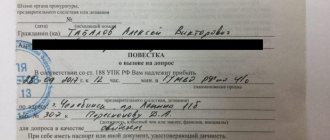The protocol of a court hearing in a criminal case is an integral element of criminal procedural legislation. It is compiled and filled out by the secretary directly in the courtroom. The minutes set out all the events that took place during the meeting. This document guarantees strict compliance with all legal rules of the judicial process, and also allows you to subsequently verify the legality of the final decision made by the court. The rules and conditions for implementing the protocol can be found in Article 259 of the Criminal Procedure Code of the Russian Federation.
Multi-channel free hotline Legal advice on criminal law. Every day from 9.00 to 21.00
Moscow and region: +7 (495) 662-44-36
St. Petersburg: +7 (812) 449-43-40
Article 259 of the Code of Criminal Procedure of the Russian Federation
Not a single court hearing in a criminal case can be recognized as valid without a protocol. This document is necessary to ensure that hearings on the case take place legally and in compliance with all norms of criminal procedural legislation. It fully reflects the scenario of the trial, including all the nuances and events that took place in the courtroom. Forms and samples of the protocol can be found freely available on the Internet.
This document is executed in printed or written form by a secretary who is in the courtroom and records all the actions of the parties to the trial and the court decision. When a case is submitted to the office, the presence of a protocol in it is a prerequisite.
The protocol can act as evidence provided that all norms and rules for its implementation are observed. This rule is regulated by Article 83 of the Code of Criminal Procedure of the Russian Federation.
A very common problem that arises during litigation is the possible presence of subjective information in a given document. All circumstances related to the investigation of the case and trial depend on the quality of the protocol. The protocol should in no case distort the available data, since this is the only document that reflects the entire essence of any trial in a criminal case. In some cases, distortion of data may call into question the legality of the protocol, and therefore the entire meeting.
All information recorded in the protocol is a reflection of the actions and decisions of the judge who is trying a particular criminal case.
This document must contain the following information:
- place of trial;
- date of its holding;
- type of meeting (open or closed);
- a brief description of the case under consideration (any criminal act, such as theft, robbery, murder, etc., as well as brief preliminary information about the circumstances of the offense);
- information about the defendant (full name, date of birth);
- information about the persons present in the courtroom (secretary, judge, prosecution, defense attorney, victims, witnesses, interpreter, plaintiff, defendant, police);
- a detailed and consistent description of the actions that took place in the courtroom;
- all motions and statements made during the trial;
- all rulings and decisions rendered by the judge and jury;
- all situations related to clarification of the rights and obligations of participants in the trial (witnesses, parties, etc.);
- details and details of all testimony that took place during the hearing;
- all questions asked by the judge and the parties to the trial;
- responses from witnesses, victims and suspects;
- information about inspections and consideration of evidence that took place directly during the trial;
- new circumstances in the case under consideration, which must be included in the protocol at the request of one of the parties to the trial;
- information about the speech of both sides during the debate;
- the last word of the defendant or a note about the refusal of the last word;
- the announced verdict (detention, correctional labor, reversal of the sentence, etc.) and other court decisions (payment of alimony, correctional labor, etc.);
- the preventive measure chosen by the court in relation to the defendant;
- information on clarification of the rights of the defendant and the parties to the hearing regarding appealing the verdict and filing appeals.
Thus, the record of the case is a detailed and detailed retelling of all the events that occurred during the proceedings.
This document allows you to recreate the overall picture of the entire process from its beginning to completion.
Sometimes photography and video recording are used during the meeting. In such cases, a note about this must be made in the protocol. In addition, it is necessary to note cases in which the entire process was broadcast on television, radio or on the Internet. All materials are attached to the case file. In the case of broadcasting, the protocol indicates the source in which it was carried out (name of television channel, radio station, Internet site).
Within three days from the end of the meeting, the protocol on the criminal case is signed by two persons:
- Secretary.
- The presiding judge.
Without these signatures, the protocol is not valid.
It is important to note that the protocol can be drawn up in full, or it can be prepared in parts. As a rule, this happens because several court hearings were held during the investigation of a criminal case. In accordance with the requirements of the Code of Criminal Procedure of the Russian Federation, the court is not required to draw up a separate protocol for each meeting held. Each part of the document is signed by the above persons, after which it receives legal force.
The parties to the meeting have the right to familiarize themselves with the minutes. Within three days from the date of completion, any of the parties may submit a written request to familiarize themselves with the data of the protocol.
Most often, such requests are approved. However, there are cases in which an application may be denied:
- if the case under consideration is sent to the appellate court;
- if the period during which the parties can submit an application to study the protocol information has expired (3 days);
- if the period during which it is possible to file an appeal in this criminal case has expired.
After approval of the petition, representatives of the parties have three days to familiarize themselves with the information in the protocol from the moment they receive the petition.
However, not only the parties to the trial have the right to familiarize themselves with the protocol. Any participant in the meeting (a witness in the case, a victim, etc.) has the right to familiarize himself with the text of the document, namely the section in which their testimony is stated.
In special cases, the preparation and proper execution of a protocol requires a period of more than three days. In this case, in accordance with the law, all parties and participants in the proceedings who requested to familiarize themselves with the protocol must be notified of the date of signing and entry into force of this document, after which they will have the right to familiarize themselves with it.
The time allotted for familiarization with the protocol depends on its volume: as a rule, it is at least five days. In some cases, this time may be extended for a certain period. Setting deadlines for familiarization is the responsibility of the presiding judge.
In addition, the parties and participants in the process may request the production of a copy of the protocol. At the same time, its certification and other necessary procedures are carried out at the expense of the applicant party.
Thus, the record of a court hearing in a criminal case is a document that is truly necessary in any criminal proceeding. The legality of the decision made by the court in criminal cases, as well as the decision of the arbitration or cassation courts, which may take part in a particular trial, depends on how correctly it is drawn up.
The biggest mistake of the legislator?
Before dispensing justice, it is very important to repair the machine of justice. Evgeniy Khankin
Part 6 art. 259 of the Code of Criminal Procedure of the Russian Federation on the preparation of a protocol within three days from the date of the end of the court hearing obviously contradicts the Constitution of the Russian Federation. This means that sentences are not made on the basis of the trial record.
Let us consider the essence of a serious procedural problem.
In accordance with Part 6 of Art. 259 of the Code of Criminal Procedure of the Russian Federation: “ The protocol must be prepared and signed by the presiding officer and the secretary of the court session within 3 days from the date of the end of the court session.
The protocol during a court session can be prepared in parts, which, like the protocol as a whole, are signed by the presiding officer and the secretary. At the request of the parties, they may be given the opportunity to familiarize themselves with parts of the protocol as they are prepared.”
Taking into account the fact that, according to Part 6 of Art. 259 of the Code of Criminal Procedure of the Russian Federation, the protocol must be prepared within three days from the date of the end of the court session; it turns out that sentences in criminal cases in accordance with Chapter 39 of the Code of Criminal Procedure of the Russian Federation are passed in the deliberation room, when the protocol of the court session on them has not yet been prepared.
In the absence of a ready protocol, a verdict cannot be passed
When at the time of sentencing there is no prepared protocol of the court session, the judge cannot be guided by anything else, in particular, his personal records, notes, etc., since the Code of Criminal Procedure of the Russian Federation does not provide for such a possibility. On the contrary, according to Part 1 of Art. 245 of the Code of Criminal Procedure of the Russian Federation, the secretary of the court session, and not the judge, keeps the minutes of the court session.
The possible argument that the judge pronounces a sentence on the basis of some draft notes of the secretary cannot serve as a justification for the established procedure, since such notes do not meet the requirements for evidence of Articles 74, 75 of the Code of Criminal Procedure of the Russian Federation. The secretary's notes on court hearings acquire legal force only after the final production of the protocol and its signing by the judge.
The possible argument that judges, being in the deliberation room without a ready-made protocol, are able to pass sentences from memory is untenable and ridiculous. This is possible if the RAM of the average judge's brain is equal to the RAM of the average computer. Even judges who have a phenomenal memory (of which there are few) will begin to forget what they heard after a few months, and by the time the verdict is pronounced, they will lose from their memory many important details of the testimony and the battles that took place. And, in fact, why pass a verdict from memory if the Code of Criminal Procedure provided the necessary clue in the form of a protocol of the court hearing?
Apologists part 6 art. 259 of the Code of Criminal Procedure of the Russian Federation can only give one decent argument: in the country, 70% of all criminal cases are considered in a special manner, where the minutes of the court session in the deliberation room are not needed at all. But, fortunately, it is not yet 100%, and therefore, the identified problem concerns 30% of all cases, and this is no less than about 300,000 cases a year.
In the absence of a prepared protocol of the court session, while in the deliberation room, the judge cannot fulfill the requirements of a number of procedural norms.
So, in accordance with Part 4 of Art. 302 of the Code of Criminal Procedure of the Russian Federation “a conviction cannot be based on assumptions and is decided only on the condition that during the trial the defendant’s guilt of committing a crime is confirmed by the totality of evidence examined by the court
"
The court cannot resort to examined evidence when the protocol is not yet ready.
In accordance with Art. 307 of the Code of Criminal Procedure of the Russian Federation “the descriptive and motivational part of the guilty verdict must contain:
1) a description of the criminal act recognized by the court as proven, indicating the place, time, method of its commission, form of guilt, motives, goals and consequences of the crime;
2) the evidence on which the court’s conclusions regarding the defendant are based, and the reasons for which the court rejected other evidence;
3) an indication of the circumstances mitigating and aggravating the punishment, and if the charge is recognized in any part as unfounded or the crime is incorrectly classified - the grounds and motives for changing the charge;
4) motives for resolving all issues related to the imposition of a criminal punishment, release from it or its serving, and the application of other measures of influence.” It is obvious that the court, without a ready-made protocol of the court hearing, is not able to state the descriptive and motivational part of the guilty verdict, provide the evidence on which the court’s conclusions regarding the defendant are based, and the reasons for which the court rejected other evidence, and resolve other issues provided for in Art. 307 of the Code of Criminal Procedure of the Russian Federation.
In the absence of a prepared protocol of the court session, the court does not have the right to draw conclusions about the defendant’s guilt in committing a crime.
This means that the entire Code of Criminal Procedure of the Russian Federation with its norms, rights, obligations and guarantees turns into a fiction, since the judicial act issued is initially illegitimate.
Preparation of the protocol in parts does not help either.
Although according to Part 6 of Art.
259 of the Code of Criminal Procedure of the Russian Federation “the protocol during the court session can be prepared in parts, which, like the protocol as a whole, are signed by the presiding officer and the secretary,”
which does not exclude the possibility of preparing the protocol of the court session in most of it at the time of sentencing, however, this norm does not protect against violation of constitutional rights.
Firstly, according to its meaning, the protocol can
be prepared in parts, that is, the judge has the right, but is not obliged, to prepare it before passing a sentence. In the vast majority of criminal cases, judges refuse to prepare the entire court record before sentencing, explaining this by the heavy workload of their secretary.
Secondly, the protocol during the court hearing can be prepared in parts and made available for review to the parties only upon their request.
So, according to Part 7 of Art. 259 of the Code of Criminal Procedure of the Russian Federation “a request for familiarization with the minutes of the court session is submitted by the parties in writing within 3 days from the date of the end of the court session.”
If there is no request, the court will not prepare the protocol in parts.
Thirdly, according to established practice, in almost all criminal cases the minutes of the court hearing are prepared after the verdict is passed.
Fourthly, even if we assume that the protocol at the request of the party could be prepared during the court session, it would in any case be incomplete, since it would not include the important stage of the judicial debate, where the parties present their position in a consolidated form, what is most important for the court when rendering a judicial act.
Established on the basis of Part 6 of Art. 259 of the Code of Criminal Procedure of the Russian Federation, law enforcement practice, when at the time of judicial debate the court record is not yet ready, contributes to the fact that the parties present their arguments based on the subjective perception of the evidence examined in court, and not on the official record, the accuracy of which they have previously verified in the prescribed manner and approved by the court.
Formal and useless procedure
Part 7 art. 259 of the Code of Criminal Procedure of the Russian Federation is also contrary to the Constitution of the Russian Federation, since it represents an empty and formal procedure for submitting comments on the protocol of a court session, when the verdict has already been passed and the testimony of the interrogated persons is presented in an interpretation convenient for the court.
The law provides that comments on the protocol are considered by the presiding officer. However, it is not taken into account that the presiding officer, after making a court decision and preparing a protocol under this decision, can no longer objectively consider the submitted comments, since he is interested in leaving the submitted comments unsatisfied, and appeals and submissions - without changes.
The judge cannot certify the correctness of the submitted comments, since he has already rendered a verdict and stated the testimony in it, and editing the testimony in the protocol will cause the verdict to be inconsistent with the protocol of the court session, which may lead to the cancellation of the verdict.
Solution
It is quite obvious that changes must be made to the Code of Criminal Procedure of the Russian Federation: the protocol of the court session must be prepared before the start of the judicial debate, the parties must have the opportunity to familiarize themselves with it in advance, make comments, and the judge must consider them in the prescribed manner.
When the court leaves for the deliberation room, it must take with it not only perceptions, sensations and ideas about what it heard and saw, but also the protocol of the court session prepared and verified by the parties.
Given the current extremely strange procedural procedure for preparing the minutes of a court hearing after a verdict has been passed, it is not at all surprising that judges often write in sentences not what took place in court hearings, but what they want, and reject comments on their improvisation without a shadow of embarrassment.
Parts 6, 7 art. 250 and Art. 260 of the Code of Criminal Procedure of the Russian Federation are the most blatant examples of legal nonsense.
The result of Art. 259 of the Code of Criminal Procedure of the Russian Federation in its current version become violations of the rights of citizens to a fair trial, established by Art. 6 of the Convention for the Protection of Human Rights and Fundamental Freedoms, as well as violations of a number of norms of the Constitution of the Russian Federation (Part 1 of Article 46, Part 1 of Article 49, Part 3 of Article 123 and others).
My appeal to the Constitutional Court of the Russian Federation with a complaint about the unconstitutionality of Part 7 of Art. 259 of the Code of Criminal Procedure of the Russian Federation was returned by letter dated August 30, 2021 on formal grounds.
But is it acceptable to remain indifferent to such a blatant and glaring procedural problem in domestic justice?
Commentary on Article 259 of the Code of Criminal Procedure of the Russian Federation
Commentary to Art. 259 of the Code of Criminal Procedure of the Russian Federation explains the basic concepts of the article, which relate to:
- Conditions for appealing a court decision.
- Responsibility for drawing up the protocol.
- Data that is required to be entered.
In accordance with Article 85 of the Code of Criminal Procedure of the Russian Federation, the protocol of the court hearing in the case can be official evidence in this case.
If the need for an appeal arises, the parties and participants in the process will first refer to this document. It can be sent to any higher authority to clarify the circumstances and consider the appeal filed. The protocol can be completed either in writing or using technical means, for example, a computer. Sometimes shorthand is used to compile a document, and the deciphered transcript is not attached to the file.
All the parameters mentioned earlier, including the location of the meeting (city, region, district), date (day, month, year) and its participants, are necessarily recorded in the minutes.
In accordance with Article 245 of the Code of Criminal Procedure of the Russian Federation and the commentary attached to it, all responsibility for the correctness of drawing up this act lies with the secretary.
Each participant in the trial, including witnesses and victims, has the right to become familiar with the text of the document within five days from the date of its final execution. Responsibility for providing the parties and participants of the meeting with their rights lies with the presiding officer.
The judicial process will be declared illegal and untenable if the protocol is drawn up carelessly, illiterately, and also if important facts, additions and actions were omitted during its preparation. Filling out documents is the responsibility of the secretary.
Depending on the specific criminal case, there may be some changes in the court proceedings, which, accordingly, affect the protocol itself. The deadline for completing the protocol may be delayed under certain circumstances. In such cases, responsibility lies with the presiding judge.
The protocol is necessary in criminal law. It is worth noting that, for example, in the procedure for conducting administrative proceedings, a protocol is not drawn up, since the level of responsibility of the decision made by the judge in such cases is much lower.






